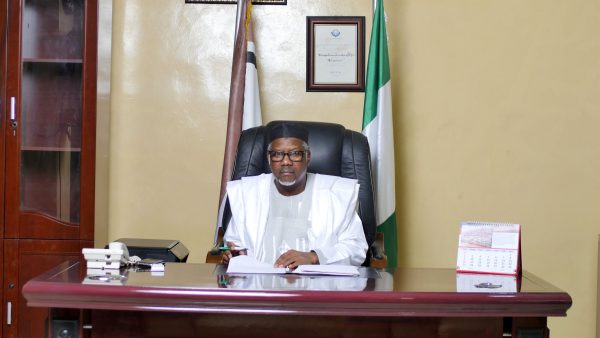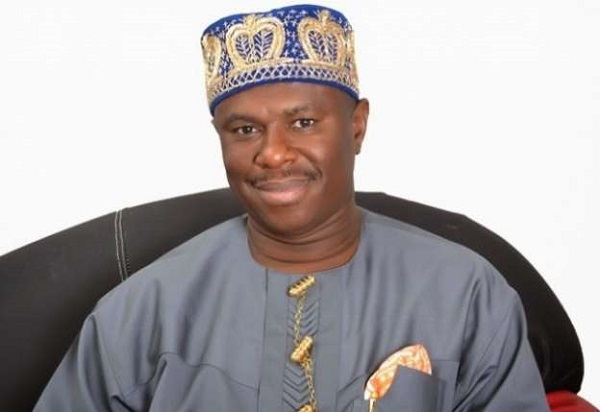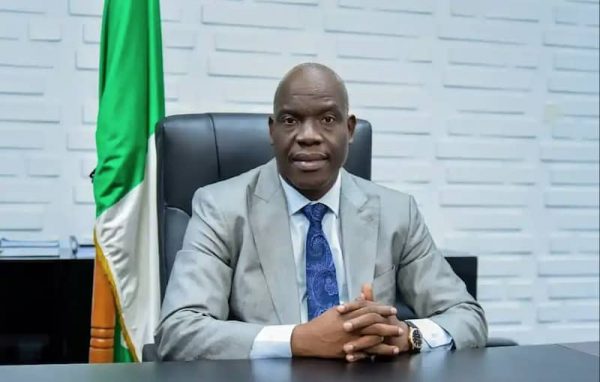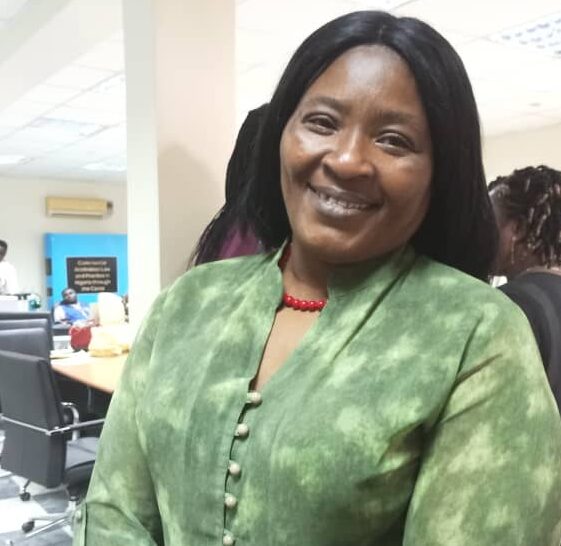I CARE INTERVIEW
Corruption Is At Its Peak At Nigerian Ports- NAGAFF Founder

The Founder of the National Association of Government Approved Freight Forwarders (NAGAFF) Dr. Boniface Aniebonam speaks with MMS Plus on the challenges facing the leadership of maritime parastatals in Nigeria, as well as the entire maritime sector. He also speaks on the land border restriction on vehicle imports and several other pertinent port sector issues.
Excerpts:
The Managing Director of the Nigerian Ports Authority (NPA) recently visited the headquarters of the National Association of Government Approved Freight Forwarders (NAGAFF). What was the outcome of the meeting?
The visit by the Managing Director of NPA, Ms Hadiza Bala-Usman was a working visit to familiarize and relate with stakeholders. During the visit, she set up a committee to articulate certain issues she promised to address. We have concluded our part and we intend to meet the Executive Director, Marine Operations, Dr. Sekonte Davies.
The emergence of the present leadership of the Nigerian Ports Authority is apparently blazing the trail to work with the critical stakeholders to achieve the set objectives of the Government. I was touched by the visit of Hadjia Hadiza Bala-Usman to the headquarters of NAGAFF as part of efforts to engage critical stakeholders in a dialogue with a view to partnering and finding solutions and returning our ports to their past glory.
Hadiza Bala-Usman has admirable qualities of a leader which have become rare in corporate governance in Nigeria. It is on record that the Director General of Standards Organisation (SON), National Agency for Food and Drug Administration and Control (NAFDAC), the Nigerian Maritime Administration and Safety Agency (NIMASA), the Nigeria Airports Authority, Inland Waterways and even the Comptroller General of Customs never thought it wise to move out to confer with the freight forwarding organized groups on the best way to overcome compliance problems which have hitherto engulfed export and import regulations of the Nigerian international trade.
Although, we appreciate the Director General of NIMASA who had received various stakeholders who had at one time or the other paid him visits to discuss matters of access to the sea, safety of life at the sea and pollution thereto. He still needs to move out and meet with the people and find out how they are fairing like Hadiza Bala-Usman of the NPA and Barr. Hassan Bello of the Nigerian Shippers Council (NSC) who find time to confer with the stakeholders on matters related to their statutory duties and responsibilities to the people.
Following Hadiza’s commendable performance so far at NPA, should the maritime sector be campaigning for more women in administration?
Generally, women are better managers. They are also better resource persons. Take a look at the home where women are multifunctional, they make sure everything and everyone in the house is in order. Women are not extravagant and in terms leadership I think they exercise the fear of God in their activities. This doesn’t mean that there aren’t few who are bad leaders and extremely extravagant. In NAGFAFF, we strongly recommend the Managing Director of NPA for higher responsibilities in governance where she can exhibit more of her managerial skills and competence.
Governance at the moment is about public-private partnership because nobody knows it all. When you get close to the people that you administer you would be in a better position to understand their problems and know how best to handle the challenges.
Some of the challenges witnessed in freight forwarding last year were on the sharing of the practitioners operating fees (POF), the classification of a declarant, etc. What are the changes you expect to see in 2017?
There is need for a change in status of the declarant in the Customs and Excise Management Act (CEMA) which has gone into the second reading at the National Assembly. Recall that during the last public hearing on the status of a declarant for the Customs, our advocate was clear on this matter. If we want to look at the professionalism, then we have to observe the procedures and recognize individuals rather than corporate bodies as declarants. A corporate body is more like a hidden person who cannot act or bear responsibility. This is something we must address, a declarant must be an individual so there is someone to hold responsible when a crime is committed. The individuals responsible for a crime easily hides under the guise of corporate bodies and these are the companies that under-declare their items.
We are working hard with the Council for Regulation of Freight Forwarding in Nigeria (CRFFN) and we have made additional input to address the issue of compliance. Most people don’t realize that in the Customs laws in section 46 and 47 on matters of under-declaration, the consequence is high even for wrong description of import. The penalty is five (5) years imprisonment not to talk of the fine, so it’s draconian.
Subsequent guidelines like the import guidelines amended in 2013 has provided a leeway for additional debit note to be issued where there are such infractions. The Customs Pre-Arrival Assessment Report (PAAR) is also a trade facilitation tool which created a new platform for the Customs. Where there is infringement, you can ameliorate the consequence which is in line with trade facilitation.
Going forward, what would you proffer as the roadmap for the nation to achieve compliance in the port industry?
In order to achieve an appropriate level of compliance by freight forwarders with due respect to Customs laws and other rules and regulations, individuals must be declarants and not corporate bodies.
What agenda do you have for the Nigerian maritime sector in 2017?
The President, Mohammadu Buhari should call for a maritime summit where a lot of things would have to be deliberated and resolved. Many things have gone wrong in the maritime sector, Transport and the nation at large, especially on matters of corruption.
Corruption is at its peak at the ports at the moment and it most unfortunate that even the agencies of government who are under oath to protect the interest of the nation, have turnaround to cheat the same government. Something is wrong fundamentally and we need to have a maritime summit to figure this out. Thereafter, we can add it to whatever information the government has and we should be able to come up with something that should increase capacity in terms of attracting investment into Nigeria and ensuring indigenous businesses thrive.
What is your opinion on the land border restriction on importation of vehicles by the Federal Government?
These things illustrates that the Federal Government isn’t comfortable with the state of things presently. Similar restrictions have been placed on items like rice and pharmaceutical products in the past. No responsible government would be relaxed to see its revenue go down the drain because they need the money to meet the nation’s needs. However, the issue of stakeholder’s partnership becomes important on how to restrict these items and ensure that the government gets its correct revenue at all times.
I think the government should be looking at regulating the tariff for imported vehicles because it is quite high, especially with the current exchange rate. We have really advocated that the Federal Government creates opportunities for people to make choices. If you’re importing a new vehicle the Customs duty should be low but if it is an old vehicle, the Customs duty should be high.
The government can create opportunities for investing in new vehicles by relaxing the import duty by making it lower by about 5% and the government has nothing to lose because the Cost Insurance Freight (CIF) levy is quite high so there would have to be some level of balancing. When we do this, we are going to save the nation from a lot of forex because when you buy an old car you would still need forex to import the spare parts to repair it.
The government should also look at the contract of affreightment for Nigeria is a sovereign state, just a Benin republic is a sovereign state or any adjoining neighbor. Any consignment destined to Cotonou is for their country, but if the cargo is meant for Nigeria, it must be indicated in the contract of affreightment ‘transit to Nigeria’ so to resolve these issues the government should look for those destined to Nigeria and give them waivers. We also have to encourage our investors in the automobile industry and protect their investments. So, the restriction is a step in the right direction.
Some terminal operators have been lamenting over NPA’s insistence that their concessionaire dues should be paid in dollars despite the forex challenges. What is your view on this?
When you look at the Standard Operating Procedures (SOP) for the NPA, one of the items talks about the discretion of the Managing Director to grant waivers on matters of payment in hard currency because most of the dues that are being paid to the Nigerian Ports Authority (NPA) are being paid in dollars. However, the terminal operators are having problems as a result of the foreign exchange. At the time they entered into this contract $1 was around N130 but today $1 is over N400 so how would they pay. If a corporate body has $1million dues to pay which should have been around N130million, how do we expect them to pay over N400million? The Managing Director of NPA should exercise some level of discretion to help and encourage the investors.
By Kenneth Jukpor






